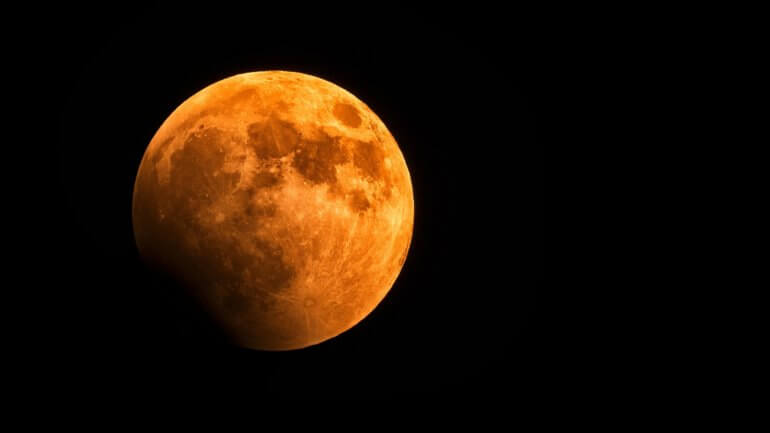
Is There Any Jewish Meaning to a Blood Moon?
Dear Jew in the City,
I just saw that there was a blood moon recently, and was wondering: is there any Jewish meaning to a blood moon?
Sincerely,
Jonathan
Dear Jonathan,
Thanks for one of the more interesting questions. Before answering, I think we should first make sure that everyone knows what a “blood moon” is. “Blood moon” refers to when the moon has a reddish appearance during a total lunar eclipse. A blood moon can only happen when the moon is full, which is right smack in the middle of each Hebrew month. It’s not a particularly common event, but it’s not exceedingly rare, either: you can expect a blood moon several times each decade.
It’s also worth mentioning that we recite brachos on a number of natural phenomena. We recite brachos on thunder and lightning. There’s a bracha for seeing a rainbow. There’s a bracha recited for the sun (once every 28 years) and one for the moon (at the start of every Hebrew month). However, no bracha is recited on an eclipse, neither solar nor lunar. The reason no bracha is recited on a solar eclipse is because such an eclipse is considered a “bad sign,” a response to the sins of mankind (Talmud Succah 29a). A lunar eclipse is a “bad sign” for the Jews (ibid.). (The reason for this distinction is because the nations of the world generally use a solar calendar, while the Jews use a lunar calendar.)
Now, of course eclipses are natural events, which can be predicted years in advance, while our actions for good or bad are up to us, so how can eclipses be bad signs? I assume that rather than God saying, “You’ve been bad, so I’m blotting out the sun/moon,” eclipses are simply a periodic reminder to examine our deeds and clean up our acts.
Now, a “blood moon” specifically may be the referent of a certain Biblical verse. You know that part in the Haggadah that says, “I will place signs in the heavens and on earth: blood, fire and pillars of smoke”? Well, that’s a verse from the Biblical book of Yoel (Joel 3:3). The next verse continues, “The sun will turn into darkness, and the moon to blood, before the great and terrible day of God arrives” (3:4). What’s this “great and terrible day of God”? The Metzudas David says it refers to the redemption (a day we’re very much anticipating), while the Malbim says it means Judgment Day (and event to which we’re very much not looking forward). However, there have been many eclipses and blood moons since Yoel made this prophecy, so while there may be such events before the “day of God” (whatever that may be), a blood moon doesn’t necessarily mean that Judgment Day is nigh.
Finally, as noted, a blood moon can only occur when the moon is full, which happens in the middle of a Hebrew month. Therefore, it should not be surprising to see one around Purim (14 Adar), Pesach (15 Nisan), Succos (15 Tishrei), Tu b’Shevat (15 Shevat) or Tu b’Av (15 Av) – all joyful occasions. Since blood moons are not particularly rare, I wouldn’t read too much into them beyond a general reminder to check ourselves before we wreck ourselves.
Sincerely yours,
Rabbi Jack Abramowitz, JITC Educational Correspondent
Follow Ask Rabbi Jack on YouTube
If you found this content meaningful and want to help further our mission through our Keter, Makom, and Tikun branches, please consider becoming a Change Maker today.








2 comments
Sort by
To be specific, the Jews use a luni-solar (some say soli-lunar) calendar, like the Chinese and many other peoples do: a calendar in which the months always start at the new moon, so the full moon always lands around the 14th of the month — that’s the lunar part. But because of several astronomical factors, the months “move” relative to the solar equinoxes and solstices.
Eventually, that means the seasonal holidays, which change every year relative to the standard (solar) calendar, would fall in the wrong agricultural seasons. Chanukkah in July! Which isn’t as big a deal nowadays, but in the past, when planting and harvesting was keyed to the moons/months, it could be disastrous.
So our calendar has leap years to correct for this “drift” of holidays. And since the seasons are caused by the Earth’s movement around the sun, that makes the calendar luni-solar.
To see the difference between a lunar and a luni-solar calendar, observe how the Islamic calendar, which is lunar, has holidays — like the month of Ramadan — that can occur in any season. This is just a guess, but it’s likely that the Israelites had a purely lunar calendar when, as a nomadic people, they simply moved to more favorable climates when the weather changed. But when they settled down in one place, they would have found it necessary to more carefully track the seasons and anchor the lunar months and rituals, too.
How can it be rational to consider an eclipse to be a “bad sign“ caused by peoples sins, when eclipses are astronomical events that run on such a struct schedule that can be (and routinely ARE) each predicted hundreds or even thousands of years before they happen?